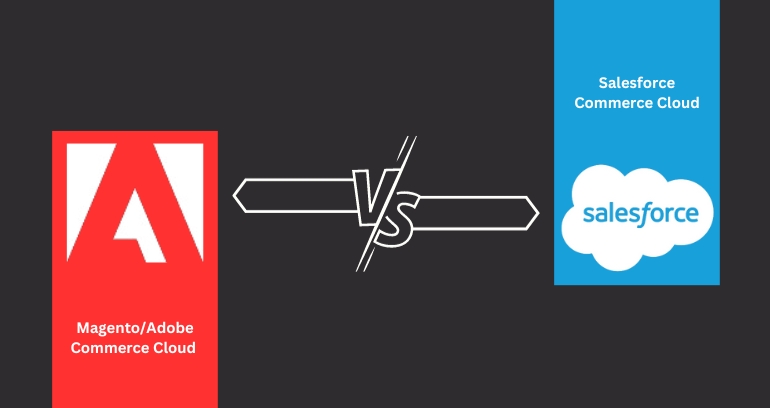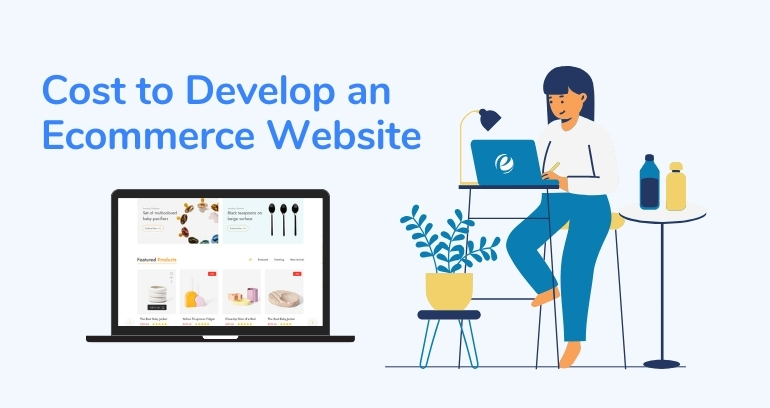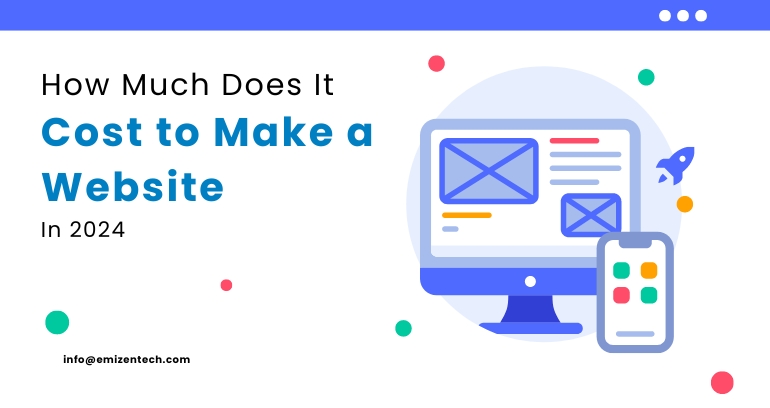E-commerce is a great boom and is not stopping at any moment. However, choosing a suitable e-commerce solution is always a tough decision. And mostly, when you have an already existing big business and are planning to re-platform, then you have to take this issue into serious consideration. So, it is necessary to seek a good e-commerce platform Solution.
Thus, two of the most known platforms are Magento and Salesforce. According to the market, there are multiple companies globally using both platforms individually. This shows that both are in hot positions to get hands-on.
Therefore, in this blog, we will discuss the overview of Magento Commerce, now Adobe Commerce vs Salesforce Commerce Cloud on the basis of the different aspects to help you decide the best for your business.
| Salesforce Commerce Cloud | Magento Commerce Cloud | |
|---|---|---|
| Parent Company | Salesforce | Adobe |
| Cloud Services | SaaS(Software-as-a-Service) | PaaS(Platform-as-a-Service) |
| Customization | Highly customizable, robust | Highly customizable |
| User Interface | Intuitive and user-friendly | Flexible but may require expertise |
| Scalability | Highly scalable | Scalable |
| Integration Options | Extensive integration capabilities | Broad range of integrations available |
| Customer Support | Comprehensive support services available | Community-based support |
| Pricing | Generally higher pricing | Variable pricing based on customers need |
| Ease of Use | User-friendly with a learning curve | May require more technical knowledge |
| Marketing Tools | Strong marketing and analytics tools | Rich marketing features |
| B2B/B2C Capabilities | Supports both B2B and B2C businesses | Supports both B2B and B2C businesses |
| Mobile Responsiveness | Strong mobile-responsive design | Mobile-responsive design |

Market Share and Stats: Magento vs Salesforce Commerce Cloud
- Approximately 692,328 websites are using Magento Commerce.
- Popular companies using Magento Commerce are Nike, Asus, Ford, Helly Hansen, Graze, etc.
- Among the above data, 140,596 Live Websites using Magento Commerce and an additional 551,732 sites that used Magento Commerce historically. .
- Approximately 12,402 websites are using the Salesforce Commerce Cloud.
- Popular companies using Salesforce Commerce are Costa Coffee, L’Oreal, Motorola, Pierre Fabre, etc.
- Among the above data are 5,286 live websites using Salesforce Commerce and an additional 7,116 sites that used Magento Commerce historically.
Magento vs. Salesforce Commerce Cloud – Overview



What Is Magento Commerce?
Magento Commerce, now Adobe Commerce, allows users to create personalized, unique B2B and B2C experiences no matter how many brands you have and is a flexible and scalable commerce platform.
Magento Commerce Cloud is a PaaS or Platform-as-a-Service platform that runs on the cloud. It includes a Microsoft Azure-based cloud server and Amazon Web Services (AWS). It offers a pre-positioned infrastructure with the most extensive technologies like RabbitMQ, Redis, PHP, MySQL, and Elasticsearch. The platform is integrated with Adobe’s tools, such as Analytic Cloud and Marketing Cloud.
Benefits of Magento Commerce Cloud
1. Multi-Channel Commerce
With a single, multichannel ecommerce solution, you can effortlessly manage every aspect of your business, whether B2B, B2C, or both. This will enable you to improve your processes and provide flawless customer experiences, from the initial impression to fulfillment and retention and beyond.
2. Scale and extensibility
Magento is a highly expandable, adaptable, and agile omnichannel commerce platform. All digital touchpoints, even those that are yet to be created, may easily be scaled and integrated with commerce experiences because of a headless, cloud-based architecture and specialized tools likeMagento Developer App Builder.
3. Personalized Commerce
Magento customization. Since not everyone fits into one size, your clientele is distinct. And the shopping trips you take need to be as well. Magento commerce’s powerful artificial intelligence and built-in features make customization simple.
4. Operational Confidence
Increase and diversify your company’s offerings without making your online store more challenging to use. Using a single back end, you can manage both B2C and B2B business channels with Magento Commerce, an enterprise-ready platform. It speeds up time to value, lowers the total cost of ownership, and simplifies operations with native integrations and AI.

What is Salesforce Commerce Cloud?
It is the most flexible intelligent commerce platform, using data, AI, and CRM. Help business drive revenue by great experience from discoveries to deliveries, deliver big results, with built-in AI recommendation that enables the cart size to increase by more percentage. There are multiple frontend technologies available in the templates to headless; you can get them right in no time.
Salesforce commerce cloud also offers multiple AI tools that help identify work to do faster. Also, it has built-in Generative AI features that make it simpler to manage ecommerce by automating hyperpersonalizing product descriptions and selecting the best merchandise strategies. Whether selling to consumers or businesses, you can embed your ecommerce everywhere.
Benefits of Salesforce Commerce Cloud
1. Reporting and Analytics Capabilities
Salesforce Commerce Cloud Services also offers a wide range of advanced reporting and analytics to help grow businesses. The most popular reporting and analytics features to help organizations make wise decisions are sales reports, customer behavior analytics, product performance reports, and more.
2. Mobile-Friendly Approach
The growing number of mobile customers worldwide has made it nearly essential for growth-seeking e-commerce companies to optimize their online storefronts to provide a superior mobile experience. Salesforce Commerce Cloud is specifically made to highlight and support the mobile-first experience, which enables companies to increase sales opportunities and establish stronger connections with global mobile audiences.
3. Robust Marketing Tools
A plethora of extremely advanced marketing capabilities are available in Salesforce Commerce Cloud to help establish and grow brand recognition and encourage customer loyalty. Businesses may use this tool to increase the impact of their marketing by focusing their efforts in the appropriate areas and boosting ROI. Companies can find and engage with the right prospects and provide them with the most relevant product at the right moment by carefully utilizing the resources available to them.
4. Automate Business Processes
Einstein AI powers Salesforce Commerce Cloud to help businesses deliver a more personalized shopping experience by utilizing the power of Einstein AI and Data. Businesses can recommend the most relevant items to customers at various interactions using Salesforce development services and Einstein AI capabilities, which elevate personalized services to a new level and help businesses convert confused shoppers into loyal buyers.

Comparison Guide: Magento Commerce Cloud Vs. Salesforce Commerce Cloud
1. Based on Features
| Features | Magento Commerce | Salesforce Commerce Cloud |
|---|---|---|
| Free trial | ✔️ | ❌ |
| 24/7 support | ❌ | ✔️ |
| Sell online and in-store | ❌ | ✔️ |
| Custom domain | ❌ | ✔️ |
| SEO features | ✔️ | ✔️ |
| Sell worldwide | ✔️ | ✔️ |
| Multi-currency support | ✔️ | ✔️ |
| Mobile friendly | ✔️ | ❌ |
| Integrated checkout | ✔️ | ✔️ |
| Email marketing tools | ❌ | ✔️ |
| App store | ✔️ | ✔️ |
| Mobile app for merchants | ❌ | ✔️ |
2. Based on AI Features
Magento Commerce Cloud
- Have predictive Insights into the new trends and behavior of the customers.
- AI-based optimized product placement and pricing strategies available.
- Tailored Content, Recommendations, and Personalized marketing strategies.
Salesforce Commerce Cloud
- Einstein AI offering predictive insights and analytics.
- Personalized Experiences and Recommendations.
- Detailed customer segmentation for targeted marketing.
- Can emphasize optimizing sales across various channels.
- AI-driven automation across marketing and sales.
3. Based on Hosting
Magento Commerce Cloud and Salesforce Commerce Cloud differ in hosting approaches. Magento Commerce Cloud is a flexible cloud-based solution offering hosting on Magento’s infrastructure or other cloud providers, allowing users to have control over certain aspects of the hosting environment. It provides scalability and customization options, enabling businesses to tailor their hosting configuration to some extent.
On the other hand, Salesforce Commerce Cloud, being a part of the Salesforce ecosystem, primarily offers a cloud-based hosting solution. The hosting infrastructure is managed by Salesforce, providing a more standardized and controlled environment, which can simplify management and reduce the need for hands-on infrastructure configuration, ensuring a more consistent experience across users.
4. Support and Security:
A variety of support options are available through Magento Commerce Cloud, such as community support, forums, and a network of developers. These services can be very helpful, but they may also call for a higher level of flexibility and skill. Security in Magento Commerce Cloud relies on the user’s implementation of security best practices and patches to maintain a secure environment.
Salesforce Commerce Cloud generally offers comprehensive support services and a more structured support system, including customer support, training, and a knowledge base. The security measures in Salesforce Commerce Cloud benefit from being part of the broader Salesforce ecosystem, often including advanced security features, regular updates, and compliance with industry standards, reducing the burden of security maintenance on the user.
5. Extensions and Plugins
There are multiple extensions and plugins present in the Magento Commerce Cloud and Salesforce Commerce Cloud that can help you add new components to the host program or extend the capabilities beyond the original design.
Magento Commerce Cloud:
- Payment Gateways: Extensions like PayPal, Stripe, and Braintree for payment processing.
- SEO Optimization: Yoast SEO, SEO Suite for better search engine optimization.
- Marketing Tools: Mailchimp, Dotdigital, and Klaviyo for email marketing and customer engagement.
- Inventory Management: Multi-Source Inventory (MSI) for efficient inventory handling.
- Enhanced UI/UX: OneStepCheckout, Amasty Layered Navigation for better user experience.
Salesforce Commerce Cloud:
- Payment Processors: Integrations with PayPal, Adyen, and CyberSource for payment solutions.
- CRM Integration: Salesforce CRM integration for seamless customer relationship management.
- Marketing Automation: Salesforce Marketing Cloud for personalized marketing campaigns.
- Analytics and Reporting: Salesforce Einstein Analytics for insights and reporting.
- Omnichannel Solutions: Integrations for social media platforms like Facebook and Instagram for sales and marketing across channels.
6. Customizability and Third-party Integration
One of the best things about Magento Commerce Cloud is how customizable it is. Users have a great deal of control over the layout, features, and general look of their online stores. With the help of this platform’s wide ecosystem of extensions, customers can customize their e-commerce website with unique features and functionalities. Deep customization is possible through code-level adjustments, giving designers the freedom to design unique and personalized online purchasing experiences.
Salesforce Commerce Cloud provides a different method. Though customization is possible, it may not offer as much fine control as Magento. To make all the things easy to fit in your business, customization can play a vital role. Talking about the third-party integrations, there are multiple Salesforce integrations available in Salesforce that can be accessed on AppExchange Apps. Integration and customizability can enhance the e-commerce platform by giving a more standardized yet powerful way to increase functionality without significant changes.
7. Marketplace Application Integration
Magento Commerce Cloud:
Magento integration presupposes typing it with solutions like order management, shipping management, or marketing automation solutions. Here are some of the mentioned from the Magento store.
1. Marketing Extension for Magento Commerce
- Dotdigital LTD- Used for data Synchronization, automation program builders, personalizing content, transactional messages, and many more.
- Yotpo- Collecting reviews, on-site display, and many more.
2. Payment and Security
- Bolt- Made for mobile, drives repeat business, bank-level security, and many more.
- Kount- Protect against chargebacks and disputes, accept good orders.
3. CRM
- Mailchimp- Communicate with the customers, grow your order, and turn website visitors into customers.
- Active Campaign- Web personalization, sales pipeline, dynamic content
Salesforce Commerce Cloud:
Salesforce integration means the process of bringing two or more systems together which allows you to streamline seperate processes. Here are some of the apps mentioned present at Salesforce very own AppExchange.
1. B2B commerce & D2C Commerce
- Foster Fraud Preventions Cartridge for DTC- To block fraudster and genuine customer experience
- Conversica- It is a revenue digital Assistants
2. Order Management
- Adyen- It provides the unified payments platforms. Also, connect directly to the Visa, MasterCard, and many preferred ways to pay.
- Concierge- OMS fulfillment for Salesforce
3. B2C commerce
- Amplience- Create an impactful multichannel shopping experience.
- Cloudinary- It is available for page designers.
8. Migration Capabilities
Magento Commerce Cloud:
The process of moving from other e-commerce platforms to Magento is made easier by the resources and tools offered by Magento. To help with the migration of product data, customer data, orders, and other important data to an e-commerce platform built on Magento, extensions and services are available. This enables the platform to become more convenient and easy to use.
Salesforce Commerce Cloud:
Businesses wishing to switch to Salesforce Commerce Cloud can do done with the help of the tools and services available for migration. That includes Salesforce Data Loader, Salesforce Data Import Wizard, JitterBit Data Loader, Dataloader.io, and Salesforce Inspector.
The purpose of these migration tools is to facilitate an easy transition from other e-commerce platforms to Salesforce Commerce Cloud. The platform provides tools and assistance for transferring orders, client information, product catalogs, and other crucial data.
9. SEO Features
| SEO Features | Magento Commerce Cloud | Salesforce Commerce Cloud |
|---|---|---|
| Customizable Metadata | Highly customizable metadata options | Basic metadata customization available |
| URL Structure Control | Granular control over URL structure and format | Limited control over URL structures |
| Content Optimization | Robust content optimization tools and resources | Basic content optimization functionalities |
| Technical SEO | Offers control over technical SEO aspects | Limited control over technical SEO elements |
| SEO Extensions | Wide array of SEO extensions available | Fewer dedicated SEO extensions |
| Canonical Tags Control | Ability to manage canonical tags effectively | Basic canonical tag control |
10. Training and Onboarding
Magento Commerce Cloud:
- Offers extensive documentation, guides, and a vast community network for support.
- Provide training materials, courses, and certifications through Magento for merchants, developers, and administrators.
- Allows exploration of the platform through trial versions or sandbox environments, facilitating hands-on experience before full implementation.
Salesforce Commerce Cloud:
- Offers comprehensive onboarding and training programs, including access to documentation, video tutorials, and a knowledge base.
- Conducts training sessions, workshops, and certifications via the Trailhead platform for users to learn various aspects of the platform.
- Provides tailored onboarding support, often including dedicated customer success managers or support teams to guide businesses through implementation and setup.
How Can Emizentech Help You to Choose One Ecommerce Platform?
Consider upgrading your ecommerce platform with Salesforce Commerce Cloud or Magento Commerce Cloud services to make a scalable and flexible end-to-end platform to ease your commerce experience management, personalization, and optimization across all the touchpoints.
Emizentech has extensive experience building advanced, feature-rich online ecommerce solutions for all-sized businesses. We can assist you in choosing Magento Commerce Cloud or Salesforce Commerce Cloud and will help you resolve that may interrupt your business venture. Hire our experts and get the best ecommerce store that will capture a secure spot in the market and grow enormously every year.

Conclusion
Choosing one from Magento Commerce Cloud vs. Salesforce Commerce Cloud totally depends on e-commerce platform requirements. Both platforms have their highs and lows at any point. As seen in the blog, we tried to put all the comparisons on the basis of different aspects so that one can understand both better. Thus, if you are still confused, don’t worry; we are here to help you; you can contact us now and consult our team of experts for any query.
Frequently Asked Questions on Magento Vs. Salesforce Commerce Cloud
Ans- Yes, they both are the same. In April 2021, Adobe changed the name of Magento Commerce Cloud to Adobe Commerce.
Ans- Yes, they have some standard features and capabilities that are often found in both platforms, such as merchandising tools, mobile responsiveness, order management, integration capabilities, and more.
Ans- Three plans are available in the Salesforce Commerce Cloud, ranging from Starter, Growth, and Plus. The starting plan for order management starts with the $0.30 USD/order. The price range further depends on the annual sales of the company. On the other hand, Magento Commerce Cloud Pricing can differ according to the features you want to add to the platform, and for a detailed guide, you can contact our team of experts.
Ans- Both the platform customization is differs and can be selected as per the requirement of the project. Choosing one from both can totally depend on the user’s perspective and the things they want in the e-commerce Platform.
Ans- Yes, you can easily migrate from any other platform to the Magento Commerce Cloud or Salesforce Commerce Cloud and can get multiple benefits.





 USA
USA UK
UK